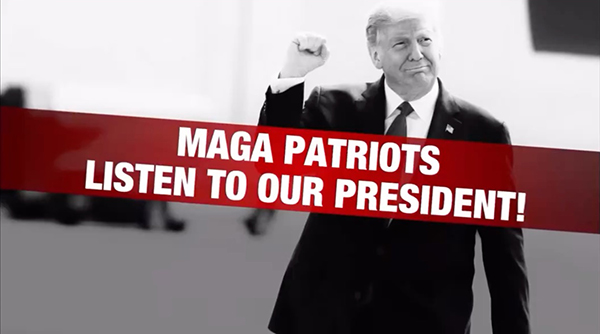

A progressive super PAC in Pennsylvania may be breaking the law with this ad. Here is a screen shot of how it starts:

After the title screen, there is a clip of Donald Trump saying: "MAIL IN VOTING IS TOTALLY CORRUPT." In fact, the entire ad features Trump telling people how bad mail-in voting is. The end title is "Stand strong with PRESIDENT TRUMP AGAINST MAIL IN VOTING!" Except for the opening and closing screens, the entire ad is video clips of Trump attacking mail-in voting. It is clearly aimed at convincing Trump supporters not to vote by mail.
The obvious goal is to reduce votes for Trump. A Trump voter who forgoes voting by mail might get sick on Election Day or there could be a big storm or his or her car could be in the repair shop or something else that prevents voting that day.
There are a couple of problems with this ad. First, telling Republicans that mail-in voting is corrupt will only fuel more distrust of elections, especially if the Election Day total in some state favors Trump but when the mail-in votes are counted the next days, Biden pulls ahead.
That is just politics at its finest, but the ad might also be illegal. Federal law makes it a crime for two or more persons to "conspire to injure, oppress, threaten, or intimidate any person... in the free exercise or enjoyment of any right or privilege secured to him by the Constitution or laws of the United States." Discouraging people from voting might qualify.
In 2016, far-right activist Douglass Mackey, using the alias "Ricky Vaughn," had 58,000 followers on Twitter. He encouraged Clinton voters to "avoid the line" by voting via text message to a phony number. About 4,900 very gullible people did this. Needless to say, those "votes" didn't count. Mackey was indicted in Feb. 2021 and tried in March 2023. The jury found him guilty and he was sentenced to 7 months in prison. Of course, the case raised significant First Amendment issues. Mackey argued that he never intended to deceive voters but he was merely engaging in lawful satire. Naturally, Mackey appealed, but the appeals process is ongoing.
Is the Pennsylvania ad, which consisted mostly of Trump speaking, illegal? It is unclear, since although the ad makers were clearly trying to discourage a particular behavior, they didn't themselves (except maybe for the end title) urge people not to vote absentee. That is at least somewhat different than lying about how to vote.
If this ad is legal, the next step would be an ad in which two people are discussing voting. The first one could say: "I think Trump is crazy but I have never voted for a Democrat in my entire life." The second one then says: "I agree, I have decided not to vote at all this year." Would that be legal? (V)